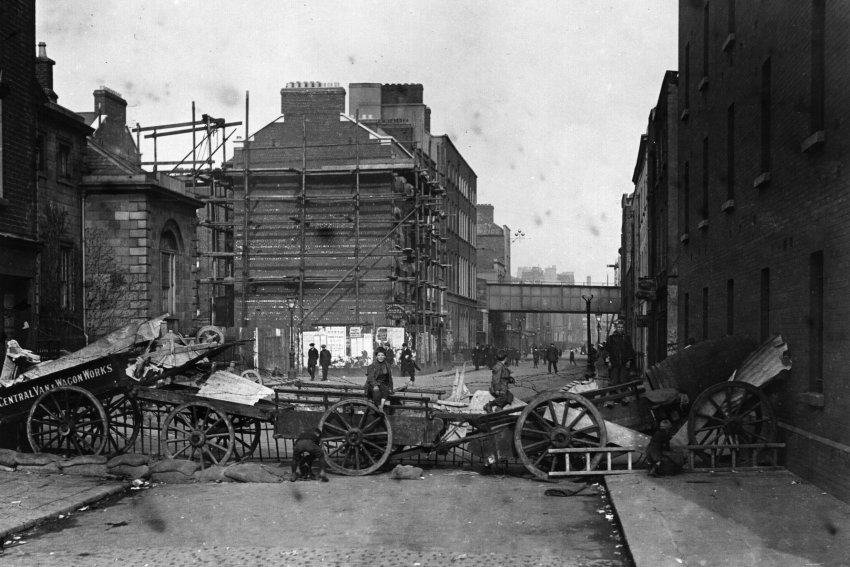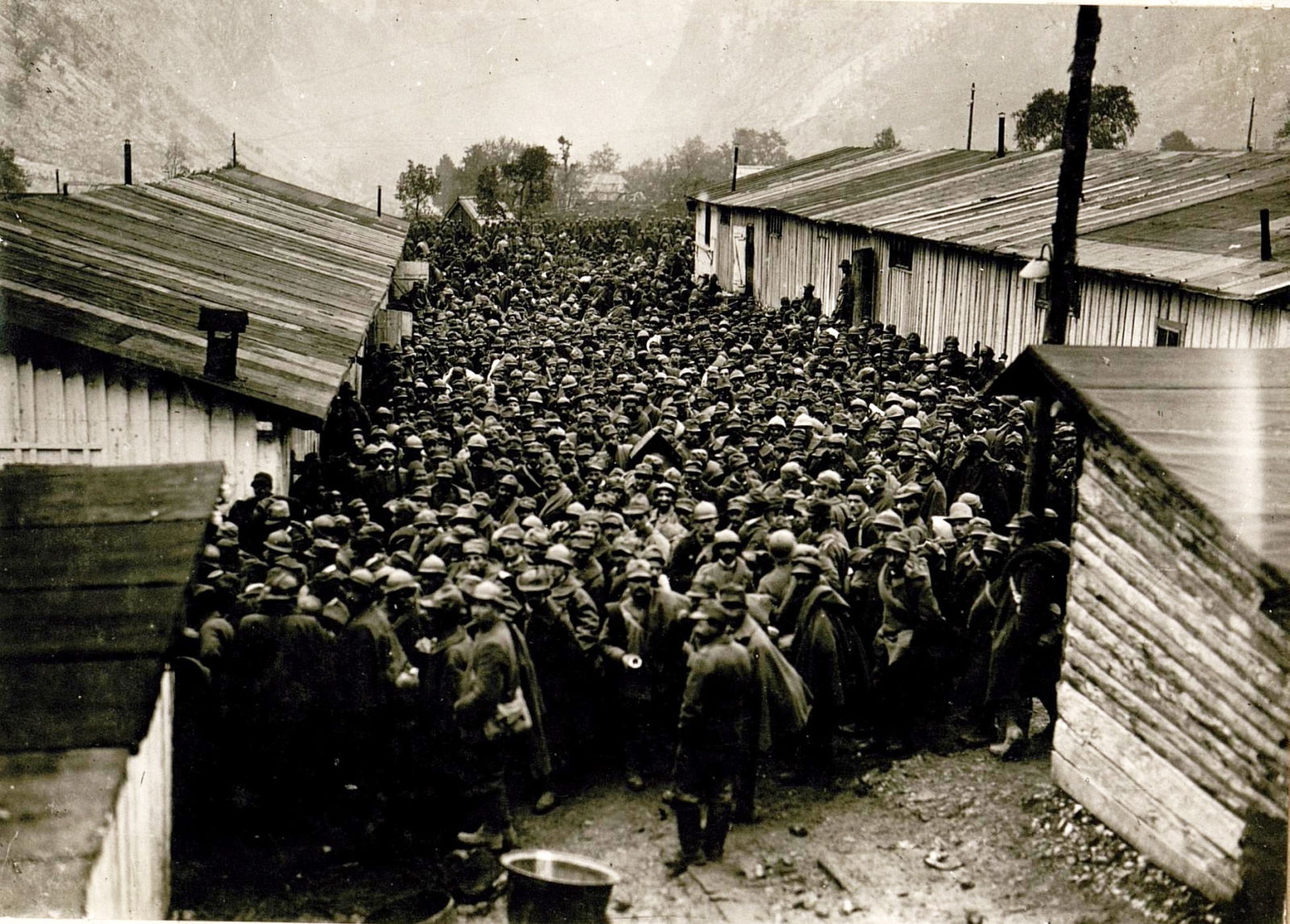The Rage of Men
At the beginning of 1917, the situation in Germany was getting worse. While the Battle of Jutland had put a dent in the Royal Navy’s Grand Fleet, it didn’t have an impact on the British blockade that was slowly strangling the country. Through a combination of poor harvests, shortage of farming fertilizers, horses requisitioned for war, and deteriorating maintenance of agricultural machinery, the German people suffer food shortages.
The people were suffering from starvation throughout the winter, as potatoes were replaced with turnips due to a potato famine in 1916. Unfortunately, the turnip was one of the least appealing vegetables known to man. It was hardly edible and just made things worse. As a result, thousands died of starvation and hunger.
Meanwhile, the Government and OHL debated whether to bring back unrestricted submarine warfare. While the High Command was in favor as this would help starve the British, Chancellor Bethmann-Hollweg was adamantly against it. He cited that such a tactic would surely bring the US into the war in Europe while having to fight another one in Mexico. In one instance, the Chancellor yelled “Nein!” 9 times. Nonetheless, it was up to the Kaiser to make the final decision. After thinking long and hard, Wilhelm decided against restarting ‘Unrestricted submarine warfare’. Also, he ordered that their espionage network in the US shift from sabotage to propaganda, prompting a great deal of anti-British sentiment among German and Irish-Americans.
Austria was severely battered after the Brusilov Offensive and was plagued by nationalist sentiment in its territories. The Ottomans were getting hammered by the British, including an Arab tribal revolt led by T.E Lawrence. Things weren’t looking good for the Central Powers. But circumstances were about to change.
Revolution
On March 8, a mass protest in Petrograd spirals snowballs into a revolution against the Tsar and the war. When Russian troops were sent in to crush the protests, the men promptly mutinied and join the growing revolution. 7 days later, the Tsar abdicates under pressure from everyone in government. The 300-year-old rule of the Romanov Dynasty ends with the Provisional Government taking its place. In the immediate aftermath, the Entente recognizes the new government in hopes of the country staying in the war and maintaining its presence on the Eastern Front. With this legitimacy, Alexander Kerensky soon announced that Russia would continue the war. In one stroke, the Russian people were again pissed.
An Orderly Withdrawal
On March 15, the Germans along the center portion of the Western Front withdraw towards the Siegfried Line, where a line of fortifications prevents an Allied breakthrough from occurring. The front shortens by 25 miles, eliminating an unneeded bulge. While pulling back, they burn everything of value in a scorched-earth policy.
When the British learned of this, they attacked at Arras and the Canadians at Vimy Ridge. After gaining huge ground on the first day, they were stopped in their tracks by ferocious German resistance.
End of the Line
In March, Swedish forces launched an offensive that saw them successfully reach Helsinki. After taking the city, Russian resistance collapsed as troops simply stopped fighting due to the revolution in Petrograd. Throughout the night they partied, danced, and drank like there’s no tomorrow. For the rest of the year, the Swedes would advance in small areas until October as most Russian forces were nearly pushed out of Finland.
For the people back home, a sense of pride and superiority overwhelmed them. The image of the underdog Swedes beating the giant, Russia, became a cornerstone of Swedish identity. Newspapers blared the idea of Sweden's war as 'Revenge for 1809'. In the decades to come, WW1 would be seen in a positive light.
Eastern Front. December 1917
Cannon Fodder
To follow up with the British at Arras, General Nivelle launches his offensive. An offensive that ended in complete disaster. The French general had planned this attack with intense detail using the latest tactics for an offense. All of that was blunted, however, with the Germans having lots of intel on when and where the French were going to attack. On the first day, things never went according to plan.
Waves and waves of Frenchman were getting cut down like flies from German machine guns. The troops had barely even advanced as their comrades were getting butchered left and right. The carnage becomes too much for the average soldier. They had been enthusiastic beforehand but were now bitterly disappointed.
After a few days, the men disobey their orders to attack. None of them went up the ladder and stick their heads out. This defiance soon spreads across the French lines. It became clear to French high command that this was a mutiny. Fearing a supposed revolution from the ranks, the French authorities crack down hard. Suspected ringleaders were court-martialed and shot. Soldiers who refused to follow orders were sentenced to hard labor. All the while, no concessions were made to the troops. While the mutiny was harshly dealt with, it would later come back to bite them in the ass.
A Master Plan
On April 16, an exiled Russian returned home to the motherland. He arrives at Petrograd Station, having traveled through a few countries to reach his destination. Once there, a huge crowd waving red flags and banners greeted him. With the situation in Russia unclear, it was now time to make some moves. Here was the man who was going to change Russia forever. His name is Vladimir Lenin.
Vladimir Lenin
1870 - 1924
Lenin had every reason to be a revolutionary. His elder brother had been part of a group that assassinated Alexander III. For his crime, he was hanged along with the others. Vladimir since then, has never forgotten what they did to his brother and vowed on taking revenge against the government. When news of the revolution reached Berlin, the government debated on how to act on this opportunity. One of them, a Social Democrat, suggested they transport Lenin, who was in Switzerland, back to Russia for him to sow chaos.
While the rest were hesitant about sending a Bolshevik revolutionary for their advantage, they saw the advantage the man had in sowing upheaval. The Kaiser wasn’t thrilled with this idea, saying “If the German military plight were not so serious, I would forbid any action of this kind!”. He feared that sending Lenin would create a monster out of an enemy. But still, the important goal was to get Russia out of the war. If the Bolsheviks were the only group who would sue for peace, then now was the time to swallow his fears and give the green light.
In May, despite the desperate situation the country was in, the Provisional Government announced it would continue the war. This made them lose most of the support it had previously experienced. For Lenin, this was an opportunity handed to him on a silver platter.
This later became a further boon when the Kerensky Offensive was launched. The attack failed as soon as it started. The Germans had been lying in wait after having been leaked of the plans while the Russians themselves had jumbled in their coordination and where seriously disunited in the ranks. Sensing they might break the enemy; the Germans launched a counteroffensive that broke the Russians’ spirit. Many Russians simply fled the battlefield and deserted in droves.
In September, the Germans advanced on the Baltics. They captured the city of Riga, eventually reaching up to Estonia. Along the way, they faced little resistance.
Mamma Mia!
With the knowledge of Russia becoming a sinking ship, the Central Powers turn their attention elsewhere. To help their Austrian ally, the Germans plan an offensive towards the Italians. They hoped this would be a knockout blow that would help make things easier. Whilst planning this offensive, the Germans and Austrians practiced coordinating their armies after the experience they gained on the Eastern front.
For most of the war, the Austrians and Italians had been locked in a stalemate over the Alps with very little territory changing hands. Even when new grounds were captured, it came with heavy casualties having to fight through rough mountains and valleys. Luigi Cadorna had always told his men to attack even in the face of impossible odds to the point that he would have ‘deserters’ and ‘cowards’ be shot. When anyone tried to object to his ways, he simply sacked them for “Lack of offensive spirit”. By 1917, Cadorna ruled through fear. Unsurprisingly, the men hated him with a passion.
On October 24, the Austrians attacked. While they expected resistance as usual, what they found was a complete collapse of the front line. Whole Italian units were retreating as fast they could, with the Austrians and Germans advancing as fast they could. All the Italians fled back across the Piave river, trying to set up a defensive line. This bought them time as the Austrians were halted and needed to resupply.
The humiliating retreat at Caporetto sparked outrage towards the government. It caused the Prime Minister to resign and made everyone feel humiliated. Fearing that Italy was about to quit the war, the Allies shored up frontline with a few divisions and some artillery.
Italian POWs after the battle
Red October
On November 6, the people of Petrograd went to sleep under a Provisional Government and woke up the next day with the entire city in chaos. The Bolsheviks had staged a coup. Kerensky, the most hated man in Russia, barely fled before they could catch him. Lenin announced a new ‘Soviet’ government where private property and private enterprise were declared illegal. Lenin also announces the end of Russia’s involvement in the war.
Thus, begins the Russians Civil War as the newly – formed ‘Red Army’ begins executing government officials and generals that were anti-socialists and could pose a threat.
Feeling left with no hope, Romania seeks an armistice. Russia soon follows in December. The Eastern front had seemingly come to an end.
A Spoiled Christmas
On December 25, a civilian freighter carrying clothes, food, toys, and gifts from the US was en route to Germany. Unfortunately, a British U-boat spotted it and had mistaken it for a German ship. With full confidence, the crew fired torpedoes and the ship was hit. When they realize what the ship was carrying, everyone knew they had just made the biggest mistake ever made.
When news of the sinking reached American shores, there was total disgust. Many Americans were outraged at the British that some protested at the gates of the British embassy in DC. The outrage was also fueled by propaganda campaign by German spies that paid off. Some of the protesters had called on the US government to cancel all loans to the Entente as revenge. President Hughes, having no choice but to make a decision, demanded the British lift the blockade or face huge sanctions. The British, having depended on American loans to finance their war, had no choice but to accept. By next year, neutral ships would be allowed to go wherever they want as long as they weren't carrying war materials.
For the Germans, what had become a tragedy had turned into a godsend. They had experienced a year of unprecedented struggling, with starvation rationing taking a toll on them. But all was not gloom, as the Kaiser had promised political reforms that would turn the country into a constitutional monarchy and vowed to abolish the Prussian three-class franchise with universal suffrage as its replacement.
His message to the people was simple: Good times were going to come, it's just a matter of holding on to the end. Stay strong.





